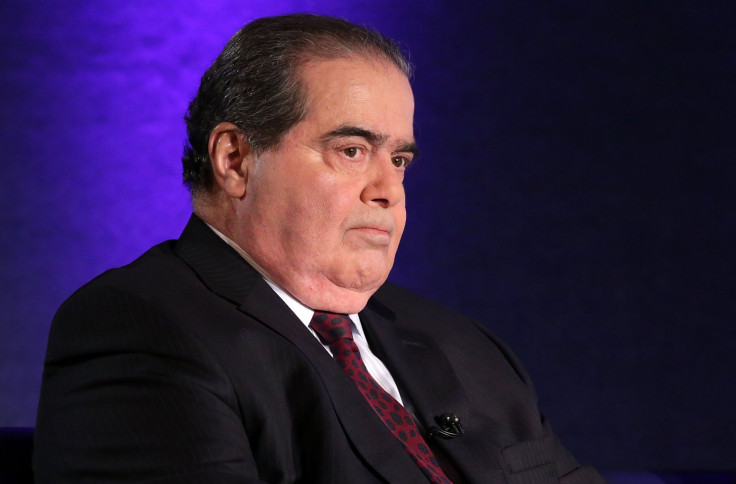US Supreme Court Justice Antonin Scalia Dead At 79

U.S. Supreme Court Justice Antonin Scalia, described as the intellectual anchor of the court, was found dead at a luxury resort in Texas Saturday. The San Antonio Express News reported that Scalia, 79, died of natural causes.
The longest-serving justice on the court, Scalia was at the Cibolo Creek Ranch in the Big Bend region south of Marfa, Texas. He reportedly arrived at the ranch Friday and attended a party with 40 other people. His body was found early Saturday after he failed to appear for breakfast.
Federal officials told the newspaper there was no evidence of foul play.
“Justice Antonin Scalia was a man of God, a patriot and an unwavering defender of the written Constitution and the rule of law,” Texas Gov. Greg Abbott said in a statement. “He was the solid rock who turned away so many attempts to depart from and distort the Constitution.”
Republican presidential hopefuls expressed their condolences.
Today our Nation mourns the loss of one of the greatest Justices in history – Justice Antonin Scalia https://t.co/8ESSQHU1VY
— Ted Cruz (@tedcruz) February 13, 2016
The totally unexpected loss of Supreme Court Justice Antonin Scalia is a massive setback for the Conservative movement and our COUNTRY!
— Donald J. Trump (@realDonaldTrump) February 13, 2016
Scalia, known to colleagues and friends as Nino, was a staunch conservative and replacing him on the high court with a liberal could change its balance significantly. Republicans in the Senate likely will attempt to hold off on confirming a nominee this late in the presidency of Democrat Barack Obama, the Hill reported.
Scalia was a defender of the powers of the executive branch, but he opposed affirmative action and other policies that gave minorities preferential treatment. His minority opinions frequently used scathing language to castigate the majority.
Scalia was appointed to the nation’s highest court by President Ronald Reagan and took his seat on the bench Sept. 26, 1986, the first Italian-American justice.

He was born in Trenton, New Jersey, March 11, 1936, the only child of Eugene and Catherine Scalia. He himself was the father of nine. He received his bachelor’s degree from Georgetown University, graduating as valedictorian and summa cum laude, and his law degree from Harvard Law School, graduating magna cum laude in 1960. Scalia was in private practice in Cleveland from 1961 to 1967. He subsequently taught law at Georgetown, Stanford University, the University of Chicago and the University of Virginia.
Scalia served in both the Nixon and Ford administrations, first in administrative agencies and then as an assistant attorney general. He argued just one case before the Supreme Court, Alfred Dunhill of London Inc. v. Republic of Cuba in 1976. He argued for the government on behalf of Dunhill and was successful.
Scalia was appointed to the Court of Appeals for the District of Columbia Circuit in 1982. During his tenure on the appellate court, Scalia won plaudits for his witty opinions. On the high court, he asked more questions and made more comments than any other justice.
“Scalia doesn’t come into oral argument all secretive and sphinxlike, feigning indecision on the nuances of the case before him. He comes in like a medieval knight, girded for battle,” Slate reported. “He knows what the law is. He knows what the opinion should say. And he uses the hour allocated for argument to bludgeon his brethren into agreement.”
Scalia wrote more concurring opinions than any other justice. And only two other justices wrote more dissents.
Scalia believed the Constitution should be interpreted as the founders understood it. “It’s what did the words mean to the people who ratified the Bill of Rights or who ratified the Constitution,” he once said. Amendments, he said, should be understood in the context of the time when they were adopted. He said a “living constitution” poses the risk of making it “all too easy to believe that evolution has culminated in one’s own views.”
© Copyright IBTimes 2024. All rights reserved.





















